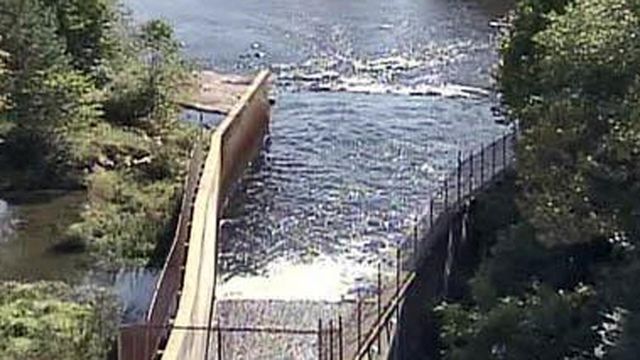Raleigh Presses for More Flow Reductions From Falls Lake
The Army Corps of Engineers agreed Tuesday to reduce the flow of water from Falls Lake into the Neuse River by 9 percent to help conserve the dwindling supply of drinking water in the lake.
Posted — UpdatedRaleigh officials had lobbied for the reduced flow as one way to extend the available water supply, and they pushed for further reductions in a Tuesday meeting with Corps officials.
Corps officials said they would cut the flow of water from the lake into the Neuse River from 55 to 50 cubic feet per second, beginning Tuesday afternoon. That decrease keeps an extra 3 million gallons a day in the lake, according to Ed Buchan, water conservation specialist with Raleigh's Public Utilities Department.
The Corps has to keep enough water flowing from the lake to maintain water quality in the river, which is the drinking-water source for several downstream cities, including Smithfield, Goldsboro and Kinston.
Mayor Charles Meeker asked Terry Brown, the Corps' water control manager for eastern North Carolina, about cutting the flow from the lake to about 27 cubic feet per second, or about 19 million gallons a day. Brown said downstream areas would have to sign off on the move, and such drastic cuts could last only until April, when spawning season for fish would require increased flows in the river.
"It would be a small savings (in water), but it certainly would be a savings," Brown said.
Thirteenth District Congressman Brad Miller, who attended the council meeting, said he would call Corps officials in Washington, D.C., to speed the process for getting the larger reductions approved.
Falls Lake, which is the primary reservoir for Raleigh and six Wake County towns on the municipal water system, is about 8 feet below normal levels. Officials have said it has enough drinking water to last at least through June 17.
Water coming into the lake has been about one-fifth of average flows for February, according to Corps officials, which they said is the lowest inflow level in eastern North Carolina.
Councilman Thomas Crowder asked Brown to compile a spreadsheet that would provide different limits for daily consumption under various conditions so Raleigh officials would know what cuts would be needed to survive through the summer.
"Pick out a target date we need to survive by," Brown said, adding calculations could change almost daily.
Public Utilities Director Dale Crisp said water demand had dropped by about 1 million gallons a day since Stage 2 water restrictions went into effect last Friday. The tougher rules banned outdoor watering and pressure-washing, closed car washes that don't recycle water and required restaurants and hotels to cut back on water use.
Dean Naujoks, a member of the Neuse River Foundation environmental group, said Raleigh should have moved to Stage 2 last fall. A city ordinance suggests officials look at imposing the tougher rules once the water supply in Falls Lake drops below 50 percent, but it was at 35 percent in October when the City Council voted to ban sprinkling.
"They waited too long, and their own municipal code said they waited too long," Naujoks said.
Buchan said the ordinance is a guideline, not a requirement, and officials held off on Stage 2 for as long as possible to avoid adversely affecting businesses.
"I don't necessarily think the ordinance was a perfect guide at that point," he said. "We also don't like to use hard, fast targets because of all the mitigating circumstances involved."
Five individuals and businesses have been cited for violating the new rules since Friday and face $1,000 fines. Councilman Rodger Koopman said the city should pursue criminal charges against repeat violators, but City Manager Russell Allen said that wouldn't be necessary because a second violation results in the cut-off of water service.
Crowder pushed the council for more discussion on even stricter water limits – a potential "Stage 4" in addition to "Stage 3," about which council members are already thinking.
Ideas on the table for "Stage 3" include requiring restaurants to use disposable plates and requiring businesses to place containers of hand sanitizer in public restrooms to cut down on hand washing. Also, exemptions in Stage 2 regulations, such as allowing car washes that recycle water to remain open, could be eliminated under tougher rules.
Meanwhile, Wake County school system officials said they have started to install 4,500 low-flow devices in bathrooms at existing schools, and all new schools are being built with such devices. Some schools also are collecting water in cisterns and using it to flush toilets and to irrigate.
• Credits
Copyright 2024 by Capitol Broadcasting Company. All rights reserved. This material may not be published, broadcast, rewritten or redistributed.






